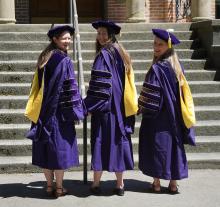By Megan Morrison
Since the beginning of time, humans have used stories to convey important information and deeply held truths. Through graduate school I have learned how important stories are, even for math and science. I am learning how to tell good stories, and if they are true, maybe they will resonate with people and the world will make a little bit more sense. Telling a good story is hard; I have a long way to go.
As an undergraduate, I initially majored in neuroscience. Although my math classes were most enjoyable, I had the impression that math was disconnected from the real world. With so many challenges in society I wanted to do something meaningful that would have a positive impact during my career. During an REU at UW with Nathan Kutz, who would be my future Ph.D. advisor, I was introduced to applied math and realized its potential to aid scientific inquiry and redefine how we understand science.
My graduate research in applied math has been very much on the “applied” end of the spectrum, modeling the neural dynamics of C. elegans and the edge dynamics of socio-political networks. Modeling natural systems is messy and requires making assumptions, subjective executive decisions, and imagination when it comes to interpreting results; these are things that mathematicians try hard to avoid. Once I have finished a model built upon layers of assumptions and speculation, I wonder how useful it will be. Oscar Wilde says that “We can forgive a man for making a useful thing as long as he does not admire it. The only excuse for making a useless thing is that one admires it intensely1”. I try to make my models simplistic, so that if they are not useful, they can at least be admired for their mathematical beauty. The ideal of an applied mathematician is to create something that is beautiful and useful, my fear is that I create models that are neither.
I have been surprised to learn how much art there is in math and science. Applied math is about telling stories. Not all information is equally interesting and not all questions are worth answering. I have struggled to find questions that are worth answering and stories that are worth telling. In La Jalousie, Robbe-Grillet introduces readers to the terrible reality of a novel not driven by a plot or characters but rather by a meticulous, objective description of the material world2. In my research I easily fall into the trap of meticulously documenting reality and struggle to bring a plot or character to the surface to drive the narrative. There is no formula for what makes something interesting and once I find something that interests me, I must convince others of its worth.
It is far from enough just to have a good idea. If a tree falls in the forest and no one is there to hear it, does it make a sound? If a mathematician proves a theorem, but no one understands his proof, did he really prove anything? Putting the pieces of a puzzle together inside my mind is half the battle, the other half is communicating what I’m thinking in a way that makes sense to others. I’m not sure what contribution I will make to math or science as an individual, but I do know that collectively, the scientific community has the ability to solve some of our greatest challenges and that effective communication not only to my peers, but also to our future scientists who are in college right now matters deeply.
I am a new postdoc at the Courant Institute at NYU this fall. The transition from being a neuroscience undergraduate to an applied math graduate student was difficult. The transition to being a postdoc in a mathematics department has been less difficult but has had similar challenges and opportunities for learning and growth as I am introduced to pure math concepts and approaches to research. It’s hard to become complacent when you are in a place that reminds you how much you still don’t know.
As an undergraduate, Nathan told me that I would never feel like I knew enough to begin my own research, I had to just go for it and transition from being a consumer to a producer of knowledge. I took that advice to heart and didn’t let my lack of knowledge restrain my exploratory process. I learned to be ok with things not going as expected because sometimes good ideas emerged from failed attempts. I expect to have many more failed attempts, and out of them perhaps new ideas will emerge that I can weave into a story about something new.
- Wilde, Oscar. The Picture of Dorian Gray. Wordsworth Editions, 1992.
- Robbe-Grillet, Alain. La jalousie. Editions de Minuit, 1957.
